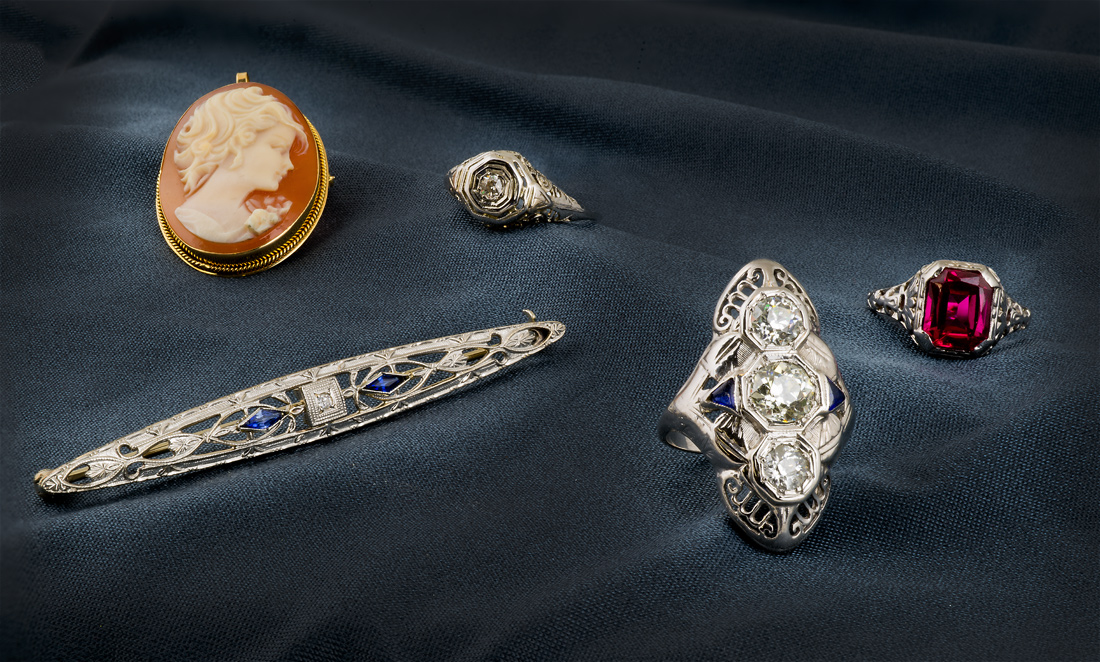Revealing the Rich History Behind Exquisite Estate Fashion Jewelry Pieces
The exploration of charming estate jewelry pieces reveals an abundant tapestry of background, reflecting the social values and creative movements of their time. As we analyze the elaborate details and provenance of these items, one have to take into consideration the extensive stories they hold-- stories that might challenge our understanding of appeal and importance in the world of precious jewelry.
The Origins of Estate Jewelry
The beginnings of estate fashion jewelry can be mapped back numerous centuries, reflecting a rich tapestry of cultural and historical influences. Jewelry served as a sign of wide range and standing among aristocrats and nobility. As various civilizations arised, distinct designs and techniques evolved, usually linked with the traditions and beliefs of their particular cultures.

As societies proceeded, estate precious jewelry started to represent more than mere adornment; it ended up being a form of personal expression, with pieces usually gave through generations. This transfer of possession imbued each thing with tales and memories, additionally boosting its value. Thus, estate fashion jewelry encompasses a myriad of impacts, enveloping the essence of human experience, artistry, and background, making it a substantial element of the fashion jewelry world today.

Remarkable Historical Eras
Throughout background, numerous eras have substantially affected the design and importance of estate precious jewelry. Each duration produced special designs, products, and cultural contexts that shaped the creativity of jewelry-making.
The Victorian age (1837-1901) noted an extensive change in jewelry design, defined by charming themes and detailed workmanship. Throughout this time, jewelry typically represented individual belief and was often utilized to celebrate substantial life events. The Art Nouveau movement (1890-1910) adhered to, highlighting organic kinds and streaming lines, drawing ideas from nature and the human figure.
The Roaring Twenties heralded the Art Deco duration (1920-1939), renowned for its geometric shapes, vibrant shades, and a sense of modernity. This period mirrored the enthusiasm of the Jazz Age and the desire for deluxe and luxury. Adhering To The Second World War, the Mid-Century Modern era (1945-1960) welcomed simpleness and performance, showcasing clean lines and innovative products.
Each of these historic ages has left an enduring mark on estate fashion jewelry, not only in regards to visual appeal yet additionally in the way these pieces mirror the social values and technical improvements of their time.
Iconic Style Characteristics
Usually, famous style characteristics of estate precious jewelry expose an abundant tapestry of social influences and imaginative movements. estate jewelry near me. Each item functions as a visual story, showcasing the stylistic preferences of its age and the artisans' mastery. For instance, the complex filigree work typical in Victorian precious jewelry image source exemplifies the duration's fascination with nature and love, frequently including motifs such as blossoms and leaves.
The Art Nouveau movement presented moving lines and organic types, stressing the charm of natural environments. In comparison, the bold geometric patterns of Art Deco fashion jewelry mirror the modernist values of the 1920s, defined by proportion and a concentrate on industrial products.
In addition, the use of dynamic gems and cutting-edge techniques, such as enameling and pavé settings, even more identifies these items. Shade palettes typically represent details social contexts, with specific rocks signifying wide range or status.
Famous Estate Jewelry Pieces
Estate fashion jewelry includes a range of distinguished items that have actually gone beyond time, each informing an unique story of its origin. Among these, the "Napoleon Diamond Necklace," originally crafted for Empress Josephine, exemplifies luxury with its complex design and historic value. Another look at here iconic piece is the "Cartier Panther Arm Band," which showcases the famous panther motif that has become identified with the Cartier name, mixing artistry with a bold declaration.
The "Bulgari Serpenti" collection, with its sinuous, snake-inspired designs, has actually mesmerized enthusiasts given that the mid-20th century, signifying high-end and appeal. In addition, the "Maharaja Pendant," decorated with a captivating range of gemstones, mirrors the majesty of Indian nobility and the abundant social heritage connected with estate jewelry.

The Value of Provenance
Provenance plays a crucial function in identifying the value of estate precious jewelry, as it provides a recorded history that boosts the piece's relevance and value. An item with a well-documented family tree usually regulates higher rates due to its association with popular numbers, historical occasions, or imaginative movements. Collection agencies and investors alike are drawn to pieces that inform a story, as these narratives add layers of meaning beyond simple aesthetic appeals.
The verification of provenance can include numerous kinds of documents, such as original purchase receipts, appraisals, and event records. Additionally, narrative histories gave through family members can add to the narrative, boosting the allure of the jewelry (estate jewelry near me). The more trustworthy and thorough the provenance, the more likely it is to bring in focus on the market
In addition, provenance can alleviate problems pertaining to credibility; things with well established histories are much less most likely to be considered as recreations or fakes. In this method, provenance not only boosts the innate value of estate fashion jewelry however additionally safeguards the collection agency's financial investment. Eventually, an engaging provenance transforms a piece from a simple things into a valued artifact of history, making it a sought after enhancement to any type of collection.
Conclusion
The exploration of estate jewelry discloses a profound link between artistry and historic context. Each piece offers as a testimony to the workmanship and social impacts of its time, showing the advancing tastes and worths of culture. The relevance of provenance more improves the allure of these treasures, changing them into valued antiques. Inevitably, the abundant narratives behind estate jewelry not just commemorate private artistry yet also encapsulate the broader tapestry of human history and social development.